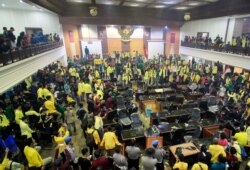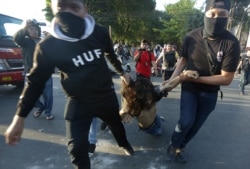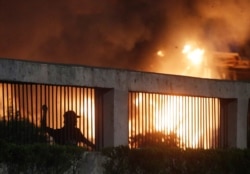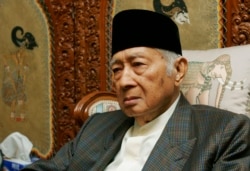Indonesia is seeing its largest protests in two decades, amid a wave of public anger at a proposed overhaul of the country’s criminal code and a controversial move to weaken an anti-corruption body.
Tens of thousands have protested this month nationwide, including in the capital, Jakarta, where police fired tear gas and water cannons to disperse student protesters outside the parliament building Tuesday.
Many are upset at a proposal that would outlaw or strengthen existing restrictions on abortion, sex outside marriage, blasphemy, and insulting the president or other symbols of government.
Others are angry at the passage of recent legislation that threatens to diminish the independence of, and strips key powers from the country’s respected Corruption Eradication Commission.
Separately, at least 30 people were killed this week during an outbreak of anti-government protests in the eastern region of Papua, where there has long been a low-level insurgency.
Challenge for the president
The developments amount to a major challenge for President Joko Widodo, who is set to begin his second five-year term in October after easily winning re-election in April.
“It’s very serious,” says Devi Asmarani, Jakarta-based founder and editor of The Magdalene, an online feminist magazine.
Widodo has long wanted to revise Indonesia’s criminal code, which was set up by the country’s former Dutch colonial rulers. His past attempts to do so have failed.
“The whole purpose was to make the criminal code more Indonesian, because it was a legacy of the Dutch colonial era,” Asmarani says. “But instead we came up with something that criminalizes everything.”
Most international headlines have focused on aspects of the bill that would outlaw sex outside marriage, and how that may impact popular international tourist destinations, such as Bali.
But the proposal, which contains more than 600 articles, could impact a large section of Indonesian society.
Women, gender minorities
Human Rights Watch called the draft criminal code “disastrous not only for women and religious and gender minorities, but for all Indonesians.”
It is likely to disproportionately affect women and criminalize same-sex conduct, something Indonesia has never done, said the rights group’s Indonesia researcher, Andreas Harsono.
Under the proposal, couples who have premarital sex could receive up to a year in prison. Unmarried couples who live together face up to six months in jail. Abortions would be outlawed in most circumstances.
Lawmakers this week delayed the proposal after Widodo bowed to public pressure, saying more input was needed. But some fear the bill could be passed by the next session of parliament.
Bill pauses, protests continue
Protests have continued even after the bill was paused. In Jakarta this week, hundreds of protesters and dozens of police officers were injured when protesters tried to break into the parliament building, officials said.
The protests are the largest Indonesia has seen since 1998 when mass demonstrations led to the resignation of Suharto, the military leader who had ruled the country for three decades.
Some protesters now accuse the government of risking a return to Suharto’s oppressive “New Order.”
The protester demands have recently widened to include an end to what they call “militarism” in Papua, the stoppage of man-made forest fires that have spread a toxic haze throughout Southeast Asia, the release of political prisoners, and other wider democratic reforms.
Reforms in jeopardy
Since Suharto’s downfall, Indonesia has undertaken a series of reforms. Observers say those reforms are now threatened by a combination of political polarization and the influence of and response to political Islam.
“There is no question Indonesian politics have moved in a more illiberal direction in recent years,” says Aaron Connelly, a research fellow at the International Institute for Strategic Studies (IISS) in Singapore.
“That is partly down to the cynical use of Islamist movements by opposition politicians to stir discontent with (Widodo),” he says. “But it is also because of actions that Jokowi himself and his appointees have taken to suppress dissent,” he said, using a nickname for the president.
Widodo is seen by some as being aligned with the political elites from the Suharto era. His attempt to revise the criminal code has also received support from some conservative Muslim groups.
It is those dual forces — the old, established bases of power combined with the long-simmering forces of political Islam — that pose a major threat, Asmarani says.
“And I think these two forces are even more powerful when they’re married,” as with the current effort to revise the criminal code, she says.








